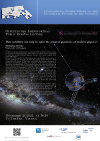
In the framework of the 16th Central European Seminar on Particle Physics and Quantum Field Theory (VCES), we announce the following public evening talk to take take place on Nov 24, 2022, 18:30 at the TUtheSky Meeting Hall, Getreidemark 9, 1060 Vienna.
How satellites can help to solve the greatest questions of modern physics?
Hansjörg Dittus
University of Bremen
Progress in physics always has been stimulated by unexplained observations or experiments. Expressions like “dark matter” or “dark energy” might help to apply the present standard physical theories, but cannot explain their origin sufficiently. In the late 19th century the observations and experiments of aberration of distant starlight or dragging of light in moving media had not been compatible with theory at that time, and finally the famous experiment of Michelson and Morley showing the constancy of light speed. The theoretical incompatibility of Newtonian gravity with Special Relativity as well as the since long observed perihelion shift of Mercury which first has been attributed to systematic errors or solely to be due to the Solar quadrupole moment, lead to the formulation of General Relativity. The experimental study of atomic spectra could not be explained with the laws of classical mechanics which first led to Bohr’s atomic model and, subsequently, to the the various formulations of quantum mechanics. The situation of fundamental physics today still causes a lot of open questions, e.g. the theoretical inconsistency of quantum mechanics and General Relativity. Furthermore, there are observations which at least until now, and after many years of studies, have not yet found any convincing explanation.
One could ask whether and how we could observe and even measure effects on spacecraft. Spacecraft could carry telescopes or serve as experimental platforms. But they can also be used as deep space probes and are substance of experiments on scales which cannot be reached on Earth.
The presentation will report on so far unexplained observations of deviations of spacecraft trajectories and discuss the possibilities for future missions and space experiments in gravitational and quantum physics.

While admission is free of charge, we would like to ask you to register for the event.
The meeting is jointly organized by the Stefan Meyer Institute of the Austrian Academy of Sciences and the Atominstitut of TU Wien, and is supported by the FWF doctoral school Particles and Interactions (P28535-N27).
Organizing Committee:
Eberhard Widmann (SMI, Austrian Academy of Sciences)
Hartmut Abele (TU Wien)
René Sedmik (TU Wien)
Contact: Hartmut.Abele@tuwien.ac.at, Eberhard.Widmann@oeaw.ac.at
 |  |  |
 |  |